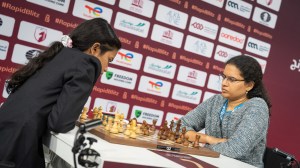145;Strive hard, stay positive146;
Pakistan, India games are all about attrition and mental pressure, and the side that absorbs it, eventually emerges victorious. This was Imr...

Pakistan, India games are all about attrition and mental pressure, and the side that absorbs it, eventually emerges victorious. This was Imran Khan8217;s message to his audience, the 24 Pakistan probables who are to take on perhaps the best Indian team to visit this country, Sunil Gavaskar8217;s 1982-83 squad being a possible exception.
The PCB, according to CEO Ramiz Raja, had organized only a half hour session, and it was eventually extended to nearly four hours and a bit. 8216;8216;It was really intense, but then you expect nothing but intensity from Imran.8217;8217;
8216;8216;He talked about stress and how to cope with it, and how to balance aggression with method. It was a very moving, very uplifting talk, and the boys simply loved every minute of it,8217;8217; said Raja.
Imran8217;s talk to the boys here at the National Cricket Academy auditorium, eventually spread over half a day, turned out to be a pep talk and a strategy session rolled into one, and each of the boys listened to one of the greatest cricketing icons of his or any generation with a lot of attention. He talked to skipper Inzamam-ul-Haq about the role a captain should play in pressure situations and had a separate session on nuances of fast bowling with the two leading spearheads of Pakistan attack, Shoaib Akhtar and Mohammad Sami.
The cornerstone of Imran8217;s talk was the same famous but simple mantra that in his reign as captain helped inspire his charges to achieve many a great victory literally from the jaws of defeat: it ain8217;t over till it8217;s over, he told them. As Imran himself later divulged talking to the waiting scribes that there may be occasions when tactics would require them to be on the defensive, but even in those moments they should never think negatively. 8216;8216;Stay positive and keep on striving,8217;8217; was the message.
8220;A Pakistan-India series always exerts immense mental pressure on the players, and my session was basically meant to tell them how best to cope with it. I tried to prepare them about handling the pressure. I told them how I used to play under pressure, especially against India, and how they can become defensive if need be but should never adopt a negative attitude. My effort was to relieve the boys from undue pressure. I would say it was a kind of mental conditioning that the players needed before the series,8217;8217; said Imran.
On Pakistan8217;s strengths, Imran said: 8220;Shoaib has won two Test series for Pakistan recently and if he stays fit he can again do wonders. So the boys should not be afraid of losing, instead they should play attacking, positive and aggressive cricket.8217;8217;
Imran, however, conceded that India may have better prospect of winning the one-day series. 8216;8216;India would have an upper hand in the one-dayers because of their strength in batting. But Pakistan would be very strong in Test matches where incisive bowling decides the issue.8217;8217;
Comparing the Indian side that last visited this country with the present one, Imran said that in 1989 Pakistan was very strong as Wasim Akram and Waqar Younis were at their peak and the Indians were underdogs. 8216;8216;But this time round the Indians are stronger on paper.8217;8217;
Imran said that it was a great opportunity for the Pakistani people to welcome and watch the Indian players perform in their backyard after a gap of about 15 years. 8220;It8217;s also a great opportunity for them to extend the greatest hospitality we always have for our guests. When we toured India in 1987, the Pakistan team received the warmest hospitality.
8220;Not only I but everyone in the country wishes that Pakistan wins the series but we should all take it as a game and show sportsman spirit. We in Pakistan look forward to the series which will improve friendly relations among peoples of the two countries. There will be no security worries for the Indian team. Let us all enjoy and let cricket win in the end,8221; said Imran.
The writer is the Sports Editor of The Nation, Lahore
- 01
- 02
- 03
- 04
- 05































